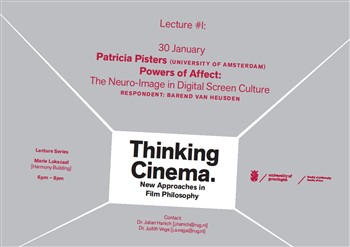Powers of Affect: The Neuro-Image in Digital Screen Culture

Lecture by Patricia Pisters (University of Amsterdam). Respondent: Barend van Heusden.
This is the first episode of the Lecture Series Thinking Cinema
Abstract
Cinema in the digital age has become a brain cinema. In today’s cinema we move through character’s brain worlds rather than following their actions or looking through their eyes. In films such as Eternal Sunshine of the Spotless Mind (Michel Gondry, 2004), Inception (Christopher Nolan, 2010), and Source Code (Duncan Jones, 2010) we see characters hooked up to a kind of brain scanning machine to mark the entering of brain worlds. However, also when it is not so literally emphasized contemporary cinema has become a ‘brain cinema’ that runs in parallel to recent discoveries in neuroscience and which differs in major ways from previous dominant modes of filming. In the tradition of Deleuze’s movement-image and time-image, I propose to call this new mode of cinema ‘the neuro-image’. The brain-worlds of the neuro-image are full of senses, gestures and affective forms of resistance. This lecture will focus on the primacy of affect in contemporary culture with a focus on ‘neurothrills’ (that are before or beyond narrative suspense) and affects of surveillance in Red Road (Andrea Arnold, 2004) and Evidence Locker (Jill Magid, 2004).
About
Patricia Pisters is professor of film studies at the department of Media Studies of the University of Amsterdam. She is one of the founding editors of Necsus: European Journal of Media Studies (www.necsus-ejms.eu) Publications include The Matrix of Visual Culture: Working with Deleuze in Film Theory (Stanford University Press, 2003) and Mind the Screen (ed. with Jaap Kooijman and Wanda Strauven, Amsterdam University Press, 2008). Her latest book is The Neuro-Image: A Deleuzian Film-Philosophy of Digital Screen Culture (Stanford University Press, 2012). See also www.patriciapisters.com
| Last modified: | 17 September 2020 5.26 p.m. |
